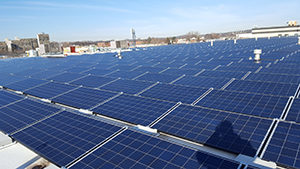Accardi Foods Partners with Solect Energy to Build Solar Array
MEDFORD, Mass. — Accardi Foods announced on Jan. 12 a partnership with Hopkinton, Mass.-based Solect Energy on the installation of a 446-kilowatt (kW) solar array on the roof of Accardi Food’s 75,000-square-foot warehouse and office facility in Medford. The project broke ground early January and an expected completion date has not yet been announced.

Photo Credit: Rasky Baerlein Boston
BDM Solar was responsible for the design and installation of the array, but the Gosford, New South Wales-based company declined to release the cost of the project. The solar array’s installation was inspired by multiple solar projects that have broken ground in Massachusetts during the past year. Its overall goal is to help the Accardi Foods become more environmentally-efficient while the company works to lower its dependency on fossil fuels.
“It is exciting to have finally taken a green initiative for our business by investing in solar, and the newfound financial flexibility will allow us to be more agile in our decision making by reinvesting in the business,” said Anthony DeVirgilio, co-founder of Accardi Foods, in a statement by Accardi Foods.
Accardi Foods will maintain complete ownership of the array, and will utilize the state’s Solar Investment Tax Credit (ITC) as well as the current solar renewable energy credit (SREC) program, according to a statement.
“Not only is the system a cost-effective decision by the company, but it will have a positive environmental impact on the area and help Accardi achieve its goal of utilizing clean energy,” said Brain Herr, vice president of business development at Solect Energy in a statement.
As a result of the project, Accardi Foods will be able to reduce energy consumption as well as their reliance on fossil fuels while achieving their goal of becoming more sustainable. The solar array will also allow the company to become less reliant on electric companies that charge them a regulated amount for power.

